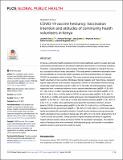| dc.contributor.author | OsurI, Joachim | |
| dc.contributor.author | Muinga, Evelyne | |
| dc.contributor.author | Carter, Jane | |
| dc.contributor.author | Kuria, Shiphrah | |
| dc.contributor.author | Hussein, Salim | |
| dc.contributor.author | Ireri, Edward Mugambi | |
| dc.contributor.editor | Shivashankar, Roopa | |
| dc.date.accessioned | 2022-03-23T14:45:23Z | |
| dc.date.available | 2022-03-23T14:45:23Z | |
| dc.date.issued | 2022-03-16 | |
| dc.identifier.citation | Osur J, Muinga E, Carter J, Kuria S, Hussein S, Ireri EM (2022) COVID-19 vaccine hesitancy: Vaccination intention and attitudes of community health volunteers in Kenya. PLOS Glob Public Health 2(3): e0000233. https://doi.org/ 10.1371/journal.pgph.0000233 | en_US |
| dc.identifier.other | doi.org/10.1371/journal.pgph.0000233 | |
| dc.identifier.uri | https://repository.amref.ac.ke/handle/123456789/626 | |
| dc.description | Copyright: © 2022 Osur et al. This is an open
access article distributed under the terms of the
Creative Commons Attribution License, which
permits unrestricted use, distribution, and
reproduction in any medium, provided the original
author and source are credited. | en_US |
| dc.description.abstract | In Kenya, community health volunteers link the formal healthcare system to urban and rural
communities and advocate for and deliver healthcare interventions to community members.
Therefore, understanding their views towards COVID-19 vaccination is critical to the country’s successful rollout of mass vaccination. The study aimed to determine vaccination intention and attitudes of community health volunteers and their potential effects on national
COVID-19 vaccination rollout in Kenya. This cross-sectional study involved community
health volunteers in four counties: Mombasa, Nairobi, Kajiado, and Trans-Nzoia, representing two urban and two rural counties, respectively. COVID-19 vaccination intention among
community health volunteers was 81% (95% CI: 0.76–0.85). On individual binary logistic
regression level, contextual influence: trust in vaccine manufacturers (adjOR = 2.25, 95%
CI: 1.06–4.59; p = 0.030); individual and group influences: trust in the MoH (adjOR = 2.12,
90% CI: 0.92–4.78; p = 0.073); belief in COVID-19 vaccine safety (adjOR = 3.20, 99% CI:
1.56–6.49; p = 0.002), and vaccine safety and issues: risk management by the government
(adjOR = 2.46, 99% CI: 1.32–4.56; p = 0.005) and vaccine concerns (adjOR = 0.81, 90% CI:
0.64–1.01; p = 0.064), were significantly associated with vaccination intention. Overall,
belief in COVID-19 vaccine safety (adjOR = 2.04, 90% CI: 0.92–4.47 p = 0.076) and risk
management by the government (adjOR = 1.86, 90% CI: 0.94–3.65; p = 0.072) were significantly associated with vaccination intention. Overall vaccine hesitancy among community
health volunteers in four counties in Kenya was 19% (95% CI: 0.15–0.24), ranging from 10.2
−44.6% across the counties. These pockets of higher hesitancy are likely to negatively
impact national vaccine rollout and future COVID-19 vaccination campaigns. The determinants of hesitancy arise from contextual, individual and group, and vaccine or vaccination
specific concerns, and vary from county to county. | en_US |
| dc.description.sponsorship | s American Tower
Corporation | en_US |
| dc.language.iso | en | en_US |
| dc.publisher | PLOS Global Public Health | en_US |
| dc.subject | COVID-19 | en_US |
| dc.subject | Healthcare workers | en_US |
| dc.subject | Formal employment | en_US |
| dc.subject | Community health workers (CHWs) | en_US |
| dc.title | COVID-19 vaccine hesitancy: Vaccination Intention and Attitudes of Community Health Volunteers in Kenya | en_US |
| dc.type | Article, Journal | en_US |

